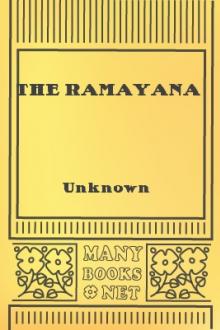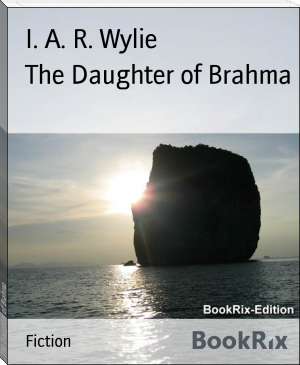The Ramayana - Valmiki (best ereader for epub txt) 📗

- Author: Valmiki
- Performer: -
Book online «The Ramayana - Valmiki (best ereader for epub txt) 📗». Author Valmiki
in Sirhind.
350.
Súryamcha pratimehatu, adversus solem mingat. An offence expressly forbidden by the Laws of Manu.
351.
Bharat does not intend these curses for any particular person: he merely wishes to prove his own innocence by invoking them on his own head if he had any share in banishing Ráma.
352.
The Sáma-veda, the hymns of which are chanted aloud.
353.
Walking from right to left.
354.
Birth and death, pleasure and pain, loss and gain.
355.
Erected upon a tree or high staff in honour of Indra.
356.
I follow in this stanza the Bombay edition in preference to Schlegel's which gives the tears of joy to the courtiers.
357.
The commentator says “Śatrughna accompanied by the other sons of the king.”
358.
Not Bharat's uncle, but some councillor.
359.
Śatakratu, Lord of a hundred sacrifices, the performance of a hundred Aśvamedhas or sacrifices of a horse entitling the sacrificer to this exalted dignity.
360.
The modern Malabar.
361.
Now Sungroor, in the Allahabad district.
362.
Ráma, Lakshmaṇ, and Sumantra.
363.
The svastika, a little cross with a transverse line at each extremity.
364.
When an army marched it was customary to burn the huts in which it had spent the night.
365.
Yáma, Varuṇa, and Kuvera.
366.
“A happy land in the remote north where the inhabitants enjoy a natural pefection attended with complete happiness obtained without exertion. There is there no vicissitude, nor decrepitude, nor death, nor fear: no distinction of virtue and vice, none of the inequalities denoted by the words best, worst, and intermediate, nor any change resulting from the succession of the four Yugas.” See Muir's Sanskrit Texts, Vol. I. p. 492.
367.
The Moon.
368.
The poet does not tell us what these lakes contained.
369.
These ten lines are a substitution for, and not a translation of the text which Carey and Marshman thus render: “This mountain adorned with mango, jumboo, usuna, lodhra, piala, punusa, dhava, unkotha, bhuvya, tinisha, vilwa, tindooka, bamboo, kashmaree, urista, uruna, madhooka, tilaka, vuduree, amluka, nipa, vetra, dhunwuna, veejaka, and other trees affording flowers, and fruits, and the most delightful shade, how charming does it appear!”
370.
Vidyadharis, Spirits of Air, sylphs.
371.
A lake attached either to Amarávatí the residence of Indra, or Alaká that of Kuvera.
372.
The Ganges of heaven.
373.
Naliní, as here, may be the name of any lake covered with lotuses.
374.
This canto is allowed, by Indian commentators, to be an interpolation. It cannot be the work of Válmíki.
375.
A fine bird with a strong, sweet note, and great imitative powers.
376.
Bauhinea variegata, a species of ebony.
377.
The rainbow is called the bow of Indra.
378.
Bhogavatí, the abode of the Nágas or Serpent race.
379.
“The order of the procession on these occasions is that the children precede according to age, then the women and after that the men according to age, the youngest first and the eldest last: when they descend into the water this is reversed and resumed when they come out of it.” Carey and Marshman.
380.
Vṛihaspati, the preceptor of the Gods.
381.
Garuḍ, the king of birds.
382.
To be won by virtue.
383.
The four religious orders, referable to different times of life are, that of the student, that of the householder, that of the anchorite, and that of the mendicant.
384.
To Gods, men, and Manes.
385.
Gayá is a very holy city in Behar. Every good Hindu ought once in his life to make funeral offerings in Gayá in honour of his ancestors.
386.
Put is the name of that region of hell to which men are doomed who leave no son to perform the funeral rites which are necessary to assure the happiness of the departed. Putra, the common word for a son is said by the highest authority to be derived from Put and tra deliverer.
387.
It was the custom of Indian women when mourning for their absent husbands to bind their hair in a long single braid.
Carey and Marshman translate, “the one-tailed city.”
388. The verses in a different metre with which some cantos end are all to be regarded with suspicion. Schlegel regrets that he did not exclude them all from his edition. These lines are manifestly spurious. See Additional Notes. 389. This genealogy is a repetition with slight variation of that given in Book I, Canto LXX. 390. In Gorresio's recension identified with Vishṇu. See Muir's Sanskrit Texts, Vol. IV. pp 29, 30. 391. From sa with, and gara poison. 392. See Book I. Canto XL. 393. A practice which has frequently been described, under the name of dherna, by European travellers in India. 394. Compare Milton's “beseeching or beseiging.” 395. Ten-headed, ten-necked, ten faced, are common epithets of Rávaṇ the giant king of Lanká. 396. The spouse of Rohiṇí is the Moon: Ráhu is the demon who causes eclipses. 397. “Once,” says the Commentator Tírtha, “in the battle between the Gods and demons the Gods were vanquished, and the sun was overthrown by Ráhu. At the request of the Gods Atri undertook the management of the sun for a week.” 398. Now Nundgaon, in Oudh. 399. A part of the great Daṇḍak forest. 400. When the saint Máṇḍavya had doomed some saint's wife, who was Anasúyá's friend, to become a widow on the morrow. 401. Heavenly nymphs. 402. The ball or present of food to all created beings. 403. The clarified butter &c. cast into the sacred fire. 404. The Moon-God: “he is,” says the commentator, “the special deity of Bráhmans.” 405. “Because he was an incarnation of the deity,” says the commentator, “otherwise such honour paid by men of the sacerdotal caste to one of the military would be improper.” 406. The king of birds. 407. Kálántakayamopamam, resembling Yáma the destroyer. 408. Somewhat inconsistently with this part of the story Tumburu is mentioned in Book II, Canto XII as one of the Gandharvas or heavenly minstrels summoned to perform at Bharadvája's feast. 409. Rambhá appears in Book I Canto LXIV as the temptress of Viśvámitra. 410. The conclusion of this Canto is all a vain repetition: it is manifestly spurious and a very feeble imitation of Válmíki's style. See Additional Notes. 411. “Even when he had alighted,” says the commentator: The feet of Gods do not touch the ground. 412. A name of Indra. 413. Śachí is the consort of Indra. 414. The spheres or mansions gained by those who have duly performed the sacrifices required of them. Different situations are assigned to these spheres, some placing them near the sun, others near the moon. 415. Hermits who live upon roots which they dig out of the earth: literally diggers, derived from the prefix vi and khan to dig. 416. Generally, divine personages of the height of a man's thumb, produced from Brahmá's hair: here, according to the commentator followed by Gorresio, hermits who when they have obtained fresh food throw away what they had laid up before. 417. Sprung from the washings of Vishṇuu's feet. 418. Four fires burning round them, and the sun above. 419. The tax allowed to the king by the Laws of Manu. 420. Near the celebrated Rámagiri or Ráma's Hill, now Rám-ṭek, near Nagpore—the scene of the Yaksha's exile in the Messenger Cloud. 421. A hundred Aśvamedhas or sacrifices of a horse raise the sacrificer to the dignity of Indra. 422. Indra. 423. Gorresio observes that Daśaratha was dead and that Sítá had been informed of his death. In his translation he substitutes for the words of the text “thy relations and mine.” This is quite superfluous. Daśaratha though in heaven still took a loving interest in the fortunes of his son. 424. One of the hermits who had followed Ráma. 425. The lake of the five nymphs. 426. The holy fig-tree. 427. The bread-fruit tree, Artocarpus integrifolia. 428. A fine timber tree, Shorea robusta. 429. The God of fire. 430. Kuvera, the God of riches. 431. The Sun. 432. Brahmá, the creator. 433. Śiva. 434. The Wind-God. 435. The God of the sea. 436. A class of demi-gods, eight in number. 437. The holiest text of the Vedas, deified. 438. Vásuki. 439. Garuḍ. 440. The War-God. 441. One of the Pleiades generally regarded as the model of wifely excellence. 442. The Madhúka, or, as it is now called, Mahuwá, is the Bassia latifolia, a tree from whose blossoms a spirit is extracted. 443. “I should have doubted whether Manu could have been the right reading here, but that it occurs again in verse 29, where it is in like manner followed in verse 31 by Analá, so that it would certainly seem that the name Manu is intended to stand for a female, the daughter of Daksha. The Gauḍa recension, followed by Signor Gorresio (III 20, 12), adopts an entirely different reading at the end ofFree e-book «The Ramayana - Valmiki (best ereader for epub txt) 📗» - read online now
Similar e-books:





Comments (0)